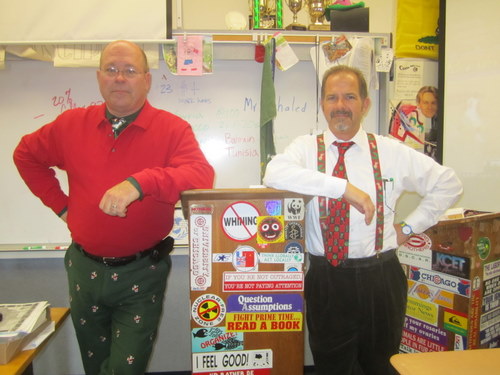
Advisors Bob Timberlake and Wayne Knutson lead Mira Costa, one of the best MUN programs in the country
Mira Costa is one of the best Model UN programs in the country. I know this from my own experience with Mira Costa delegates when I was in high school, but their success speaks for itself. Mira Costa wins Best Delegate and delegation awards at every Model UN conference they attend. Last year, they claimed the #1 spot on Best Delegate’s High School Model UN Rankings. And most impressively, they’re consistent; Mira Costa has been a force to be reckoned with ever since I started doing Model UN over a decade ago.
What is Mira Costa’s secret to success in Model UN?
I blogged Mira Costa’s LAIMUN Conference last weekend, which I viewed as an opportunity to not only broadcast how they put on their own conference, but to understand what makes their program tick. I spoke with several student leaders, including Secretary-General Mackenzie Austin and Under-Secretary-General Michael Powell, and advisors Bob Timberlake and Wayne Knutson. KFC and I also visited Mira Costa High School the other day to observe their Model UN class. And from what I saw, the secret to Mira Costa’s success in Model UN is really no secret at all…
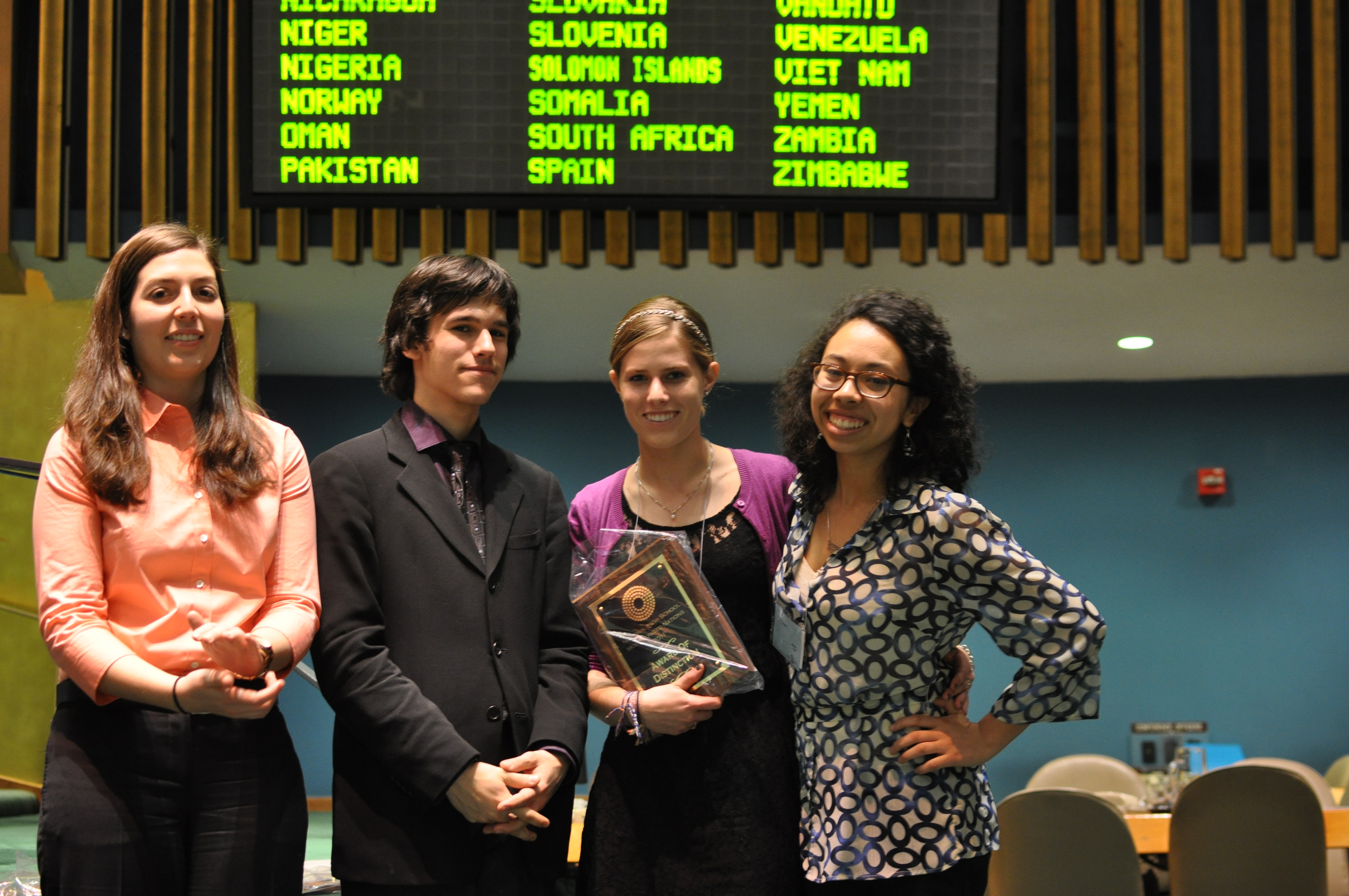
Mira Costa's culture of research and preparation helps win awards. Last year, Mira Costa won an Award of Distinction at National NHSMUN, and placed #1 on Best Delegate's High School Model UN Rankings.
Mira Costa’s success comes from having a strong culture of research and preparation.
What I’m referring to goes beyond reading background guides, studying current events, or compiling research binders. Any delegate can do these things, but Mira Costa delegates share a key trait that takes their performance to the next level.
Mira Costa has the attitude, motivation, and discipline to research and prepare as much as possible for every conference. Delegates are required to prepare not just position papers and research binders for every conference, but also “laminates,” “roasting sheets,” and other preparation materials that are unique to Mira Costa. The advisors “roast” their delegates before each conference, questioning their country policy and possible solutions in order to ensure quality research and adequate preparation. Everyone I spoke with emphasized the importance of research and preparation, whether it was about attending a major conference or putting on their own.
It’s difficult for any organization, whether it’s a Model UN club or a Fortune 500 company, to cultivate this kind of culture. But Mackenzie summed up Mira Costa’s culture for me in one sentence: “No one goes into a conference unprepared.”
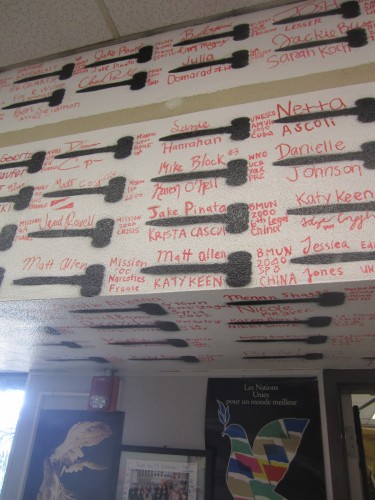
Mira Costa honors its Best Delegates by writing their names on the classroom wall -- and even the ceiling!
Most importantly, Mira Costa’s culture of research and preparation makes them successful beyond awards.
KFC and I tend to focus on awards when we describe Mira Costa’s success because they’re tangible and measurable, but Mira Costa is successful for more than their awards. Mira Costa delegates learn a lot about their countries and topics because of the amount of research they do, and they develop formidable public speaking and debating skills because of how they prepare. But the real success comes after they graduate from high school, when Mira Costa alumni realize that Model UN has prepared them well for college and their careers.
But what’s really telling about Mira Costa’s success is how they feel when they don’t win awards. I spoke with a few delegates who said they’ve been “skunked” at a conference, meaning they didn’t win an award when they felt they should have. They remembered being upset at first, even ashamed for not winning. But upon reflection, they realized that they researched and prepared the best they possibly could, and no chair and no conference could take away what they learned or the experience they gained. In other words, so long as they did their best to research and prepare, Mira Costa delegates saw themselves as successful, regardless of awards.
I’m aware that Mira Costa gets criticized for being very aggressive in committee. I know I felt this way about them when I was a delegate; I even wrote about this in one of my first posts on Best Delegate. And I realize now that it’s because they’re trained to be the most knowledgeable delegate in the room and out-research everyone else. This criticism is also part of a larger discussion about the role of competition and awards in Model UN.
But regardless of how you feel about competition and awards, Mira Costa’s culture of research and preparation promotes the purpose of Model UN. If you like the competitive part of Model UN — awards — research and preparation are how you win. If you like the educational part of Model UN — learning — research and preparation are how you learn.
Mira Costa succeeds in terms of both awards and learning, and I believe that every Model UN team — at both the high school and college level — has something to learn from Mira Costa’s culture of research and preparation.
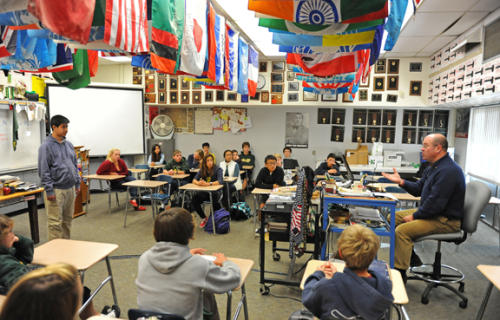
Mira Costa is successful for more than awards. Delegates learn a lot through their research and preparation. (Photo Credit: Brad Graverson from dailybreeze.com)
Here are 5 things I learned about Mira Costa that I believe any Model UN team can do to improve their research and preparation.
1. Recruit students who are willing to research and prepare.
Model UN is an elective class at Mira Costa, meaning students have to choose to be there. Any student can take Model UN for one semester during their freshman year, which gives them a chance to learn about the activity, attend conferences, and decide if it’s something they want to commit to. To continue after freshman year, students then have to try out for the Model UN team by participating in a simulation. But according to Mira Costa delegates, you don’t have to be a good speaker to get in; it’s more important to have the right attitude and show that you’re willing to work hard.
Unlike Mira Costa, most Model UN teams are clubs, not classes, and their main challenge is just getting people to sign up, but the lesson here is not to make recruiting competitive; rather, you want teammates who want to be there, know what’s expected of them, and are willing to learn. Like Mira Costa, you can hold tryouts that aren’t meant to be exclusive, but to show potential members that there is work involved in learning Model UN. You can also target students who might be more motivated to learn, as KFC suggested in this Best Delegate post on recruiting top talent.
2. Make research and preparation a requirement for every conference.
Mira Costa delegates have to prepare various materials before every conference. This not only includes position papers and research binders, but also unique Mira Costa materials such as “laminates.” For each topic, Mira Costa delegates create a two-sided laminated document that has bullet points and images summarizing their country policy and possible solutions on one side, then their country name and flag on the other side.
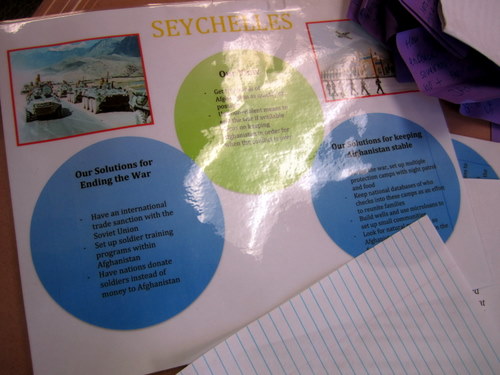
Mira Costa delegates are required to prepare various materials for every conference, such as "laminates" above that use bullet points and images to summarize country policy and possible solutions
Being laminated means that it stands out in committee; Mira Costa delegates can hold their laminates when they make a speech and their country name shows, and if you walk by a laminate during unmoderated caucus, you’ll wonder what it is. Even better, some Mira Costa delegates will lend their laminates to other delegates who need help making speeches.
They aren’t afraid to lose it because it’s laminated, and not only is it great sportsmanship and an example of students teaching other students, but also a way of building their brand in committee; another delegate is speaking off the laminate but everyone else in committee sees Mira Costa’s country name!
But the value of laminates and other materials, including position papers and research binders, lies in the exercise of preparing them. A delegate who takes preparation seriously is someone who wants to succeed at the conference. Preparing these documents also helps delegates synthesize their research; something like laminates makes Mira Costa delegates boil down all of their research into its most important points. And requiring this kind of preparation sends a signal to your team that you are committed to doing the best you can at your next conference.
You don’t have to require something as elaborate as a laminated document for each conference your team attends, but I would encourage you to make the following items required preparation documents:
- Position papers
- Research binders (click here for 15 Things Every Delegate Should Have in their Research Binder)
- One page of talking points on each topic (e.g. your country policy, possible solutions, etc.)
- Optional: Opening speeches (if you’ve prepared talking points, then you don’t have to write out speeches)
It’s also important to share your research and preparation with your team as a way to evaluate one another, hold each other accountable, and continually improve.
3. Empower seniors to teach underclassmen how to research and prepare.
Mr. Timberlake told me this is something he learned from coaching football: seniors set examples for the rest of the team. Mira Costa seniors teach underclassmen directly in class and they design the training curriculum. Seniors are paired with underclassmen for conferences in order to show new delegates the ropes. It also serves as additional motivation for the seniors, who don’t want to be shown up by an underclassman who’s more well-prepared.
Model UN is a very student-driven activity and your seniors, or your most experienced MUNers, might already be leading your club in leadership roles such as Head Delegate or Secretary-General. But make sure your seniors across the board, whether or not they have a leadership title, are involved in training your team. Create “mentor-mentee” relationships on your team by assigning seniors to several underclassmen and have them work together during training sessions, especially when it comes to learning how to research. You might also want to consider pairing your seniors with underclassmen for conferences.
4. Hold high standards for research and preparation.
Mira Costa’s advisors hold high expectations for their delegates. Before every conference, they “roast” their delegates, asking them questions about their research, country policy, and possible solutions. It starts off as a way to make sure that delegates have done their homework, and then it turns into a more Socratic discussion to question their understanding and expose flaws in their arguments. They push their delegates to have better than “Wikipedia-level” understanding of their topics. Mira Costa has class subscriptions to The Economist and The Financial Times, which delegates study in class, and they also subscribe to various university library resources in order to read academic papers on their topics.
If you’re just starting as a Model UN club, then you might not know what qualifies as a high standard for research and preparation. This is particularly tough because it’s something that comes with experience. But what’s more important is that you keep raising the bar for you and your team. After each conference, determine what the gaps in your research were and find out how to close those gaps when researching for your next conference. Even if your team is new to Model UN, you can still ask each other questions about your research.
5. Reflect on every conference, especially on your research and preparation.
After each conference, Mira Costa delegates (except freshmen) are required to write conference evaluations. “We don’t have video,” Mr. Timberlake told me, referring to how sports teams review past performances, “but we do have writing.” Each evaluation includes a description of what happened in committee, from making speeches to caucusing to resolution writing, as well as a reflection on how the delegate can improve for future conferences, and an evaluation of fellow Mira Costa delegates in committee. Mr. Timberlake provides written feedback and keeps evaluations confidential so that students can be candid.
Similarly, you and your teammates can write post-conference evaluations. The exercise of writing the evaluation is useful because it forces you to replay the conference in your mind. Share your evaluations as a team in order to determine where each of you should improve. Reflect on how your team feels about the awards that were given and the lessons that you learned. And most importantly, use this evaluation to define what success means for you and your team.
Thank you to Mackenzie and Michael, and Mr. Timberlake and Mr. Knutson for speaking with me, having me visit LAIMUN, and letting KFC and me observe their Model UN class!
What do you think of Mira Costa? What do you do to research and prepare for Model UN conferences? Let us know in the comments below!

